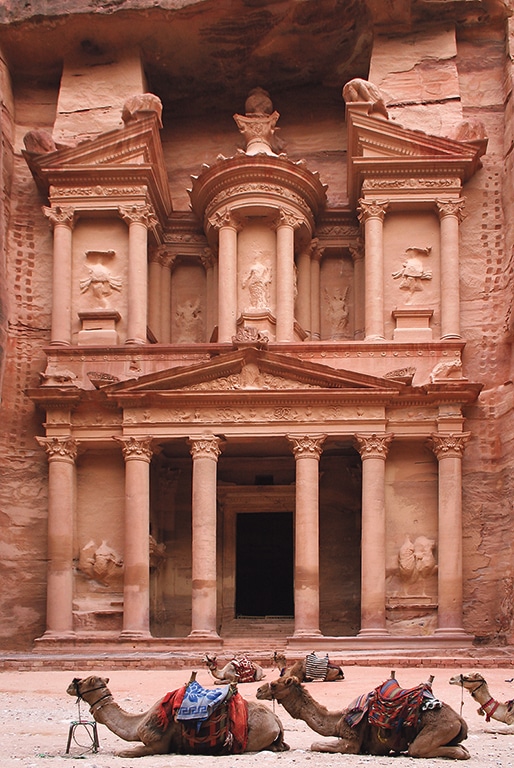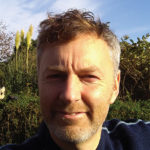Jordan had been on my radar for years, as a place I was keen on exploring. It’s a country teeming with history and biblical landmarks. It has borders on the Red Sea, an ocean teeming with a kaleidoscope of colourful life, and the Dead Sea where nothing can live because of the insanely high levels of salt. Its history is ancient and mysterious: You can walk in the footsteps of biblical figures such as Jesus, Moses, Lot. Whether your experience is purely historical or you’re engaging on a pilgrimage of sorts, you can’t help but be awed. The ancient city of Petra is indeed one of the wonders of the world and their deserts are, much to my delightful surprise, breathtaking. Perhaps its greatest asset are the people – warm, honest, kind, genuine and, as we learnt, if you are Irish, so very welcoming.
We had booked a trip to Jordan long before the deadly Israeli assault on Gaza began. The war has left its mark there. What was evident was that high season (because November to February you don’t suffer the intense heat) was more like low season. Many venues reported the drop in tourists being as much as 50 per cent. Was there reason to be concerned? There are times in Jordan you are literally a stone’s throw away from the West Bank, Israel and occupied Palestine. Even as I write today, there is no guarantee that the Arab nations won’t be pulled into a regional conflict. America has targeted and destroyed sites in Syria. Israel and Hezbollah have been firing rockets at each other, to and from Lebanon. Even during our visit, there was a rocket fired from Yemen into Israel (it was intercepted and destroyed). Perhaps these are small splinter groups acting independently, but once national boundaries become porous, there’s no guarantees that one’s national sovereignty will be respected. Remember it was Israel’s war cry that they had the right to defend themselves. This defence has since taken the form of an invasion of Gaza, and blanket bombing of Gaza, so who’s to say more ‘invasions’ won’t occur?
It was within this framework that our journey began. I was curious about how Jordanian’s see the war and how they perceive the west. As much as I wanted to observe the historical sites and simply be a tourist, I set out to understand the viewpoints of Jordanians and so I sought out their opinions along our way.
Jordan for a start is an extremely safe place to visit. Crime is low and respect is high. And though their society is not as affluent as Europe, the standard of life is good. I saw only one unfortunate beggar there. When you compare that to just Dublin alone, it makes you think about the societal chasm that has developed in Ireland – something you just don’t see in Jordan. We wondered whether Jordanian cars possessed indicators or was it just an option? But once you understood the ‘rules’ of their roads, driving became relatively easy as long as you did it in the day. In the rural areas, you won’t find street lights and their roads have large amounts of speed bumps and many potholes that creep up on you without warning. Like any European destination, online accommodation was as per normal – plentiful, and easy to find. Not so much local eateries. If you want to avoid tourist hotels, then it’s more of a challenge to find a place to eat. Perhaps the best place we ate was a tiny family restaurant – literally in a family home. While your meal is cooked, the family and children come to greet and chat to you. Nothing was forced. You can be as engaging or reticent as you wish. We found it interesting to ask our female host about religion and life for women in Jordanian society. It certainly is a world where perhaps like pre-1950’s Europe, religion plays a more lived and expansive role in their lives. Will secularism become an element of future Arab/Muslim societies? It does seem very ingrained into the fabric of society but not in any forced way. Educated women like our host, simply believe in the tenets of their religion and can choose to follow it or not. Most do. Children have exposure to religion classes early in life not unlike the catechism many of readers my age and older would have received. For now, they wear it easy and make it part of their lives.
The Jordan river is synonymous with the baptism of Jesus by John the Baptist. Though Jordan is an overwhelmingly Muslim country, these sites remain sacred. Jesus after all is seen as their third most important prophet and not just a part of Christian culture. Today the river Jordan symbolises the ills of the world. It’s no longer a mighty river, more like a large stream – the result of climate change. The guide at the site told us the 50-degree heat is not uncommon these days during the summer. Sadly, across from this holy site, is another reminder of humanity’s dysfunction: Barbed wire, and towers hoisting the Israeli flag, menacingly peer down on it. It’s tantalising close – too close say some Jordanians, believing it a temptation for the ever-expanding Israel. Perhaps the war has provoked such emotions. Within the area, there are a plethora of churches; Orthodox, Catholic, Armenian and Muslim mosques – highlighting the religious significance of the site. The Jordanian guide somewhat insightfully suggested why have all the denominations when one holy shrine would be enough and unify all. There is something in that. From here you can look over to the hills of Jerusalem, look out at the deserts where Jesus wandered for forty days and nights, see the distant outline of Jericho and the waters that begin their journey in the Sea of Galilee. The Holy Land does not simply sit neatly in modern borders. It is ever present in the region at large.
Within forty minutes drive, lies a place that is every childhood fantasy – the Dead Sea. Does every child not marvel at the stories of floating effortlessly on water? It certainly captured my imagination as a child and my excitement was palatable. The place itself is framed by a rocky, barren shoreline. On the northern side a few fancy hotels have wrapped themselves around the shore but for the most part this vast lake, (It’s actually not a ‘sea’), is natural and naked. If you don’t use a hotel to access the shoreline, then one has to amble down a rocky incline to the lake’s edges. And yes – it is truly magic. You cannot sink. Such is the quantity of salt that one can simply float. Do not get the water in your eye or throat; the sting is terrible. Twenty to thirty minutes is the recommended limit. You pay a local a few dollars for water and a hose and that’s your shower!
The drive south is spectacular and there are three roads to choose from, each going through desert regions. I was expecting just rocky barren banality but was met with wonder. They have vast mountains of sandstone that are weathered by wind and sand, carving out eye-catching shapes. There are famous deserts such as Wadi Rum, where the Laurence of Arabia film was filmed. This is a landscape of rich fine red sands and mountain stacks that stand scattered in the region. Many choose to camp in tourist accommodation, or you can hire someone to take you on a desert safari. It’s mesmeric in its own right and a complete contrast to our green isle.

You can’t go to Jordan without a visit to Petra. It was created by the Nabataeans in the third century BC. How did people, with such rudimentary tools and knowledge manage to carve out the most exquisite temples, and facades from these mountainous rocks. Anyone who saw the Indiana Jones movie will understand its draw. High up on in this mountain area in a remote land, the architects of this yesterday world, created a warren of beautiful architecture. The Romans and Persians thought so and built their own architectural gems on to this ancient kingdom. It’s a massive site that needs exploring. If I had to make one criticism, it was sad to see how harshly treated the poor beasts of burden were: donkeys, camels, and horses – touting tourists about, often left without water. This can be avoided, and conversations were had, with minimum effect I’m afraid. But be aware, if you buy anything within, it will have come in on a grossly overburdened and neglected animal. Choose to bring your own food and water if you’re principled about such matters.
And so to the war. Everywhere we went, we entreated the people to speak on Gaza. Most of the responses were what you’d expect – human ones – hurt, tears, anger, heartbreak. There were rare occasions, when Israel’s right to remain in the Middle East was questioned. Is Israel so blind as to not realise their acts are hardening more hearts? Others professed disillusionment with Europe, with America, at the lack of any action by their own government that is controlled by a monarchy. But they were unified in acknowledging Ireland. It’s strange that a part of the world I knew very little about, know more of us. The people understand our long association with the freedom of small nations. They are certainly clued into the voices of dissent emerging from Ireland – from our politicians to our people. Across the border, an Israeli minister, Amichi Eilyahu, declared on radio that the Gazans can flee ‘to Ireland or the deserts’. Here in the deserts of Jordan, there is a blossom of Irishness growing amongst the Jordanians. Who would have thought it?



